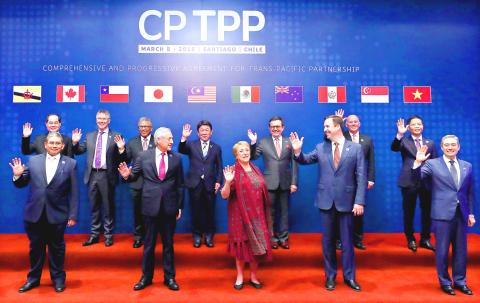The Ministry of Foreign Affairs pledged to continue to lobby for support regarding Taiwan’s participation in the Comprehensive and Progressive Agreement for Trans-Pacific Partnership (CPTPP), which came into effect yesterday.
The ministry congratulated CPTPP members in a statement, calling it an “important achievement” that was especially significant to the economic development of Asia-Pacific and the world.
The ministry also urged CPTPP nations to accept new members, including Taiwan, soon.

Photo: EPA-EFE
Taiwan’s participation would enhance the partnership and the economic development of the Asia-Pacific region, the ministry said.
“The ministry will continue to show CPTPP members the nation’s determination ... and promote its participation when the timing is appropriate,” it said.
Separately yesterday, Minister Without Portfolio John Deng (鄧振中) said that the government would apply to join the partnership near the end of next month, once the application procedures for new members become clearer.
Application procedures would likely be made apparent after the CPTPP nations hold a minister-level meeting in late January, said Deng, who doubles as head of the Executive Yuan’s Office of Trade Negotiations.
Joining the partnership is an important goal for Taiwan’s foreign policy, he added.
Following the passage of a Chinese Nationalist Party (KMT)-initiated referendum on Nov. 24 to ban food imports from five prefectures following the 2011 Fukushima Dai-ichi nuclear disaster, Japanese Minister of Foreign Affairs Taro Kono last month said that Tokyo did not rule out taking the issue to the WTO.
He also suggested that it would make Taiwan’s chances of joining the CPTPP — which is led by Japan — unlikely.
In response, Minister of Foreign Affairs Joseph Wu (吳釗燮) said he hoped that Taiwan’s participation would not be affected by a single issue.
The CPTPP, which replaced the Trans-Pacific Partnership after the US withdrew from the deal, was signed in March, and the agreement yesterday came into force for the initial six ratifying countries — Canada, Australia, Japan, Mexico, New Zealand and Singapore.
The free-trade agreement represents a market of about 500 million people and accounts for 13.5 percent of global trade.
The CPTPP’s 11 members account for 25 percent of Taiwan’s total foreign trade, with Japan, Singapore, Malaysia and Vietnam among the nation’s top 10 trading partners, while the 11 nations receive 30.42 percent of Taiwan’s outbound investment.
Additional reporting by Chen Yu-fu and CNA

Right-wing political scientist Laura Fernandez on Sunday won Costa Rica’s presidential election by a landslide, after promising to crack down on rising violence linked to the cocaine trade. Fernandez’s nearest rival, economist Alvaro Ramos, conceded defeat as results showed the ruling party far exceeding the threshold of 40 percent needed to avoid a runoff. With 94 percent of polling stations counted, the political heir of outgoing Costa Rican President Rodrigo Chaves had captured 48.3 percent of the vote compared with Ramos’ 33.4 percent, the Supreme Electoral Tribunal said. As soon as the first results were announced, members of Fernandez’s Sovereign People’s Party

EMERGING FIELDS: The Chinese president said that the two countries would explore cooperation in green technology, the digital economy and artificial intelligence Chinese President Xi Jinping (習近平) yesterday called for an “equal and orderly multipolar world” in the face of “unilateral bullying,” in an apparent jab at the US. Xi was speaking during talks in Beijing with Uruguayan President Yamandu Orsi, the first South American leader to visit China since US special forces captured then-Venezuelan president Nicolas Maduro last month — an operation that Beijing condemned as a violation of sovereignty. Orsi follows a slew of leaders to have visited China seeking to boost ties with the world’s second-largest economy to hedge against US President Donald Trump’s increasingly unpredictable administration. “The international situation is fraught

MORE RESPONSIBILITY: Draftees would be expected to fight alongside professional soldiers, likely requiring the transformation of some training brigades into combat units The armed forces are to start incorporating new conscripts into combined arms brigades this year to enhance combat readiness, the Executive Yuan’s latest policy report said. The new policy would affect Taiwanese men entering the military for their compulsory service, which was extended to one year under reforms by then-president Tsai Ing-wen (蔡英文) in 2022. The conscripts would be trained to operate machine guns, uncrewed aerial vehicles, anti-tank guided missile launchers and Stinger air defense systems, the report said, adding that the basic training would be lengthened to eight weeks. After basic training, conscripts would be sorted into infantry battalions that would take

GROWING AMBITIONS: The scale and tempo of the operations show that the Strait has become the core theater for China to expand its security interests, the report said Chinese military aircraft incursions around Taiwan have surged nearly 15-fold over the past five years, according to a report released yesterday by the Democratic Progressive Party’s (DPP) Department of China Affairs. Sorties in the Taiwan Strait were previously irregular, totaling 380 in 2020, but have since evolved into routine operations, the report showed. “This demonstrates that the Taiwan Strait has become both the starting point and testing ground for Beijing’s expansionist ambitions,” it said. Driven by military expansionism, China is systematically pursuing actions aimed at altering the regional “status quo,” the department said, adding that Taiwan represents the most critical link in China’s